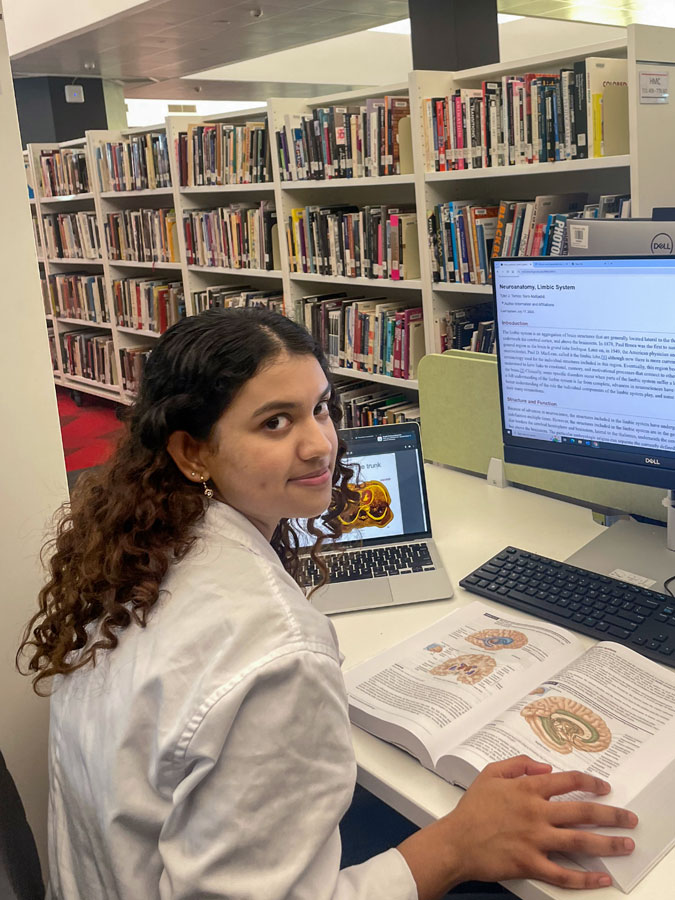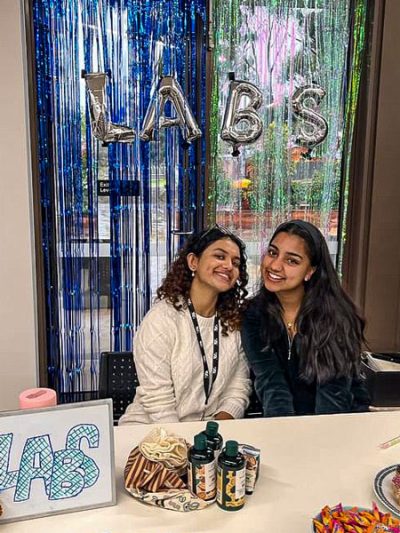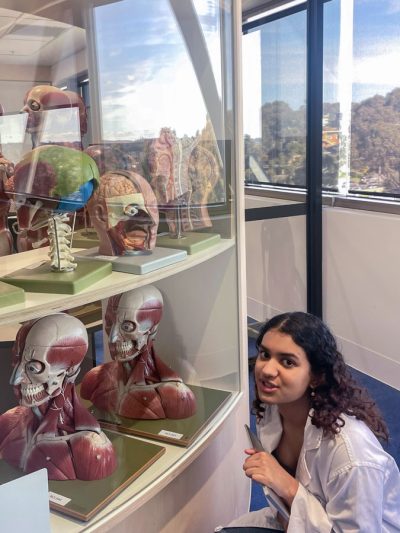GPSN member Tess Poulose is in her first year of The University of Melbourne’s end-to-end rural medical program, studying at La Trobe University’s Bendigo campus.
The Rural Medical Pathway offers a unique opportunity for students from rural or regional backgrounds to study and eventually practice medicine in non-urban communities.
“The Doctor of Medicine program has 30 Commonwealth-Supported Bonded Medical Places, with 15 reserved for La Trobe University’s Bachelor of Biomedical Science (Medical) graduates,” Tess explains.
“It’s aimed at students who are committed to practicing medicine in a rural or regional setting and who don’t feel limited by the ‘bonded’ aspect of the program since they are also from a non-urban background.”
The Rural Medical Pathway has been a perfect fit for Tess, allowing her to maintain her regional lifestyle and stay connected with her family.
“The flexibility of studying regionally is something I cherish,” she says.
“I’ve found a supportive, vibrant network of staff, students, and locals in Bendigo.
“The multidisciplinary approach of the course has been fascinating, as I’ve seen how different healthcare professionals work together to support a patient’s treatment and recovery.”
Tess enthusiastically recommends the Rural Medical Pathway to prospective students, highlighting its inclusivity and comprehensive training.
“The program is open to a wide range of applicants, including those from non-school leaver or non-biomedicine backgrounds, as long as they meet the entry requirements,” she notes.
“The commitment to academic and clinical excellence is unwavering.
“The staff and tutors are dedicated, and the welcoming culture and diverse clinical cases make it a rewarding experience.”
Despite the supportive environment, Tess acknowledges the challenges she’s faced in her journey.
“The medical school entrance process can be complex,” she says.
“I had to navigate this by reaching out to teachers, current medical students, and doctors, and forming study groups with my peers.”
Tess is forging her own path in medicine, driven by a deep-seated desire to serve her community and an unwavering commitment to healthcare.
Born in Kerala and raised in various Australian towns, Tess has called Ballarat home for the past eight years.
Her journey into medicine is not just a career choice but a calling, deeply rooted in her family’s values and personal experiences.
“My parents worked in aged care in a small rural Wimmera town, which sparked my initial interest in healthcare” Tess recalls.
Her parents often used homemade remedies to treat minor ailments, but it was a pivotal moment involving her younger brother that solidified her desire to pursue medicine.
“My little brother had a stomach ache that was repeatedly dismissed as obstipation,” she said.
“When he was finally referred to the Royal Children’s Hospital in Melbourne, they diagnosed him with Crohn’s Disease.
“Seeing the relief on my parents’ faces after speaking with a knowledgeable doctor had a profound impact on me as a child.”
“Looking back, it made me realise the importance of accessible, holistic clinical care, especially in rural areas.”
Tess is particularly drawn to a career in general practice, where she sees the opportunity to treat a diverse range of patients and conditions.
“General practice is challenging and requires resourcefulness,” she explains.
“I admire rural generalists who provide quality care without a full complement of specialist staff and resources.
“Building long-term relationships with patients and their families is unique to general practice.
“The continuity of care is not only rewarding but also crucial for better patient outcomes.”
As Tess looks ahead to her future in medicine, she envisions a career that combines her interests in mental health, obstetrics and gynaecology.
“I can’t say for certain where I’ll be in 10 years, but I’m interested in biomedical research and possibly becoming a general practitioner or rural generalist,” she says.
“My focus would be on preventative measures and building health literacy, taking a population health approach.
“I hope to continue learning and remain committed to providing reliable, thorough, and empathetic treatment.”
Tess is also a recent member of the General Practice Students Network (GPSN), where she sees great potential for career development and networking.
“I admire student-led organisations like GPSN and look forward to becoming more active in this space,” she shares.
Reflecting on her journey to date, Tess doesn’t point to a singular “Aha!” moment but rather a series of experiences through years of volunteering and working in healthcare that reaffirmed her decision to be a doctor.
“It was so rewarding to be included in a patient’s health journey in any capacity,” she recalls.
“But I was always frustrated that I didn’t have the knowledge or skills to help more.”
“The idea of having the level of patient contact and expertise to make a tangible difference to a patient’s health makes a career in medicine worth completing for me.”
Tess Poulose’s story inspires medical students to consider the rewarding and impactful career of general practice, especially in rural and regional settings.
Making the case for rural GP
Considering practising medicine in the bush? Here are some things you can expect:
- Contributing to a patient’s primary, secondary, and tertiary care
- Working with diverse and complex cases
- Learning additional skills.







